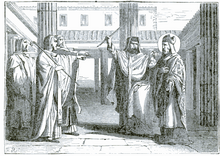Diogenes of Cyzicus
When Eutyches' complaint was reread at the Chalcedon, Eusebius of Dorylaeum pointed out that, while Eutychus correctly denied that Christ's flesh came down from heaven, he did not state from where it came.
Like the other bishops there, Diogenes assented to and signed the proceedings of the Second Council of Ephesus, namely the restoration of Eutyches to his position as archimandrite and the deposition of Flavian and Eusebius.
However, some of these bishops later withrew their assents, accusing Dioscorus of threatening them with a mob, forcing them to sign a blank paper, and having his notaries forge statements from them.
They requested to hear Dioscorus' opinion first, arguing that Canon 6 of Nicaea[note 2] forbids them from making a decision without him, to which Diogenes mocked them saying "How can someone who has no idea what he believes elect a bishop?"
In discussing the wrongoings of rival provincial Bishops Bassianus and Stephen of Ephesus, Eusebius of Dorylaeum noted that their consecrations were contrary to the canons.
[note 4] When it was suggested that both Bassianus and Stephen be retired with a pension and a new bishop appointed for Ephesus, Diogenes replied to the general positive chant of "This is a pious proposal.
He signed the last session on behalf of both himself and Cyzicus' suffragan bishops: Timothy of Germe, Alexander of Oce, Philostorgius of Scepsis, Gemellus of Miletopolis, Eutychianus of Baris, and Acacius of Proconnesus.
